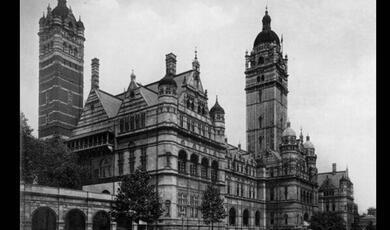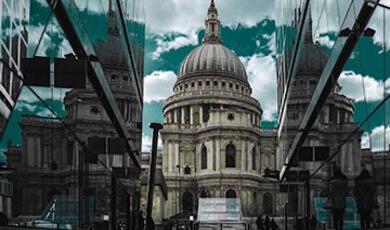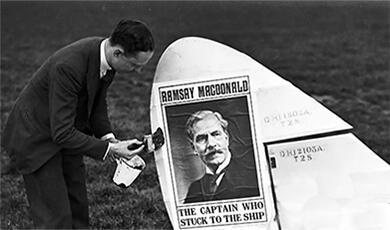Sheep Across London Bridge - The Freedom of the City of London
Share
- Details
- Text
- Audio
- Downloads
- Extra Reading
One of the oldest surviving traditional ceremonies still in existence today is the granting of the Freedom of the City of London. It is believed that the first Freedom was presented in 1237. The medieval term 'freeman' meant someone who was not the property of a feudal lord, but enjoyed privileges such as the right to earn money and own land. Town dwellers who were protected by the charter of their town or city were often free - hence the term 'freedom of the City'. Other lectures in the series: 7 December and 26 January
Download Text
9 November 2011
Sheep Across London Bridge:
The Freedom of the City of London
Murray D Craig
Clerk of the Chamberlain’s Court, City of London
Can you take sheep over London Bridge?
The answer is no because the City of London Police are not keen on this custom in the 21st century. This is not altogether surprising because of all the busses, taxies, commuters, Boris cyclists and anti-capitalist protestors crossing London Bridge and while it is an amusing thought of Freemen in smocks and crooks and Little Bo Peeps, it would cause absolute traffic chaos! We laugh at the custom today but in the Middle Ages it was a very different story - it was a valuable economic privilege. It was not so much that you could take sheep over the bridge but that you did not pay the toll. You would be taking the sheep to the Wool Exchange or Smithfield Meat Market for sale and not paying the toll would considerably enhance your profit margin. You could take cattle, pigs, hens, ducks, geese - indeed any livestock over the bridge and not pay the tariff but in the medieval period the sheep was queen of the beasts because the wool and cloth trade was the bedrock of the English economy. It is said that as more sheep went over the bridge than any other animals put together that the bridge was built and maintained on the back of the sheep.
Occasionally today Freemen can take sheep over the bridge but it is usually for charitable purposes. Lord Mayors from time to time arrange sponsored sheep drives for their chosen charity. 2009 marked the 800th anniversary of London Bridge so for one Saturday it was closed for traffic and so Livery Companies arranged a trade and craft fair and the Lord Mayor provided some sheep to take across the bridge. Recently we had a Welsh Lord Mayor, David Rowell Thomas Lewis, who was very keen on a sponsored sheep drive and, unusually for a Lord Mayor, was a dab-hand in the lambing shed as his family had a small holding in the Cothi Valley in Carmarthenshire. It is fair to say that most Lord Mayors would not know one end of the sheep to another! In the millennium year, Sir Clive Martin arranged for a special sheep drive - not any old mutton for Sir Clive but pedigree Jacobs sheep. The wool was blow dried, the hooves were gleaming and fluorescent yellow bibs. Health and safety of course was paramount. Representatives of the Livery Company made a donation and the Masters took it in turn to walk a sheep over a section of the bridge. Sir Clive was very clever and did not invite two Livery Companies to participate. He did not invite the Woolmen or the Butchers; both of who would have spoiled the occasion. The Woolmen would have sheared the sheep and the Butchers would have slaughtered the sheep for dinner!
Some years ago, I admitted a Freeman with a very large flock indeed and said “Sir even you cannot take your flock across London Bridge”. This was Rowan Williams, the Archbishop of Canterbury. He was very charming and said “funnily enough I have some sheep in a field near Canterbury and to be quite honest with you, I have less trouble with them than I do with my real flock.”
So what of other privileges?
Freemen could be hanged with a silk rope if they committed murder or treason; you could wander around the City with your sword drawn to defend yourself from footpads; you were exempt from the tender mercies of the press gang because as a Freeman and a skilled craftsman, you were far too valuable to be carted off to the sea; you could be drunk and disorderly and granted safe passage home from the Watch. Sadly none of these privileges are available today. The main remaining privileges are of a charitable and educational nature. For example, a widow could go the Freemen’s Almshouses and an orphan could go to the Freemen’s School without paying a fee. There is also a Christmas fund for impoverished Freemen which pays 75 pounds 10 shillings and sixpence.
What is the Freedom?
The Freedom of the City of London is very ancient indeed and goes back to the early 13th century. We think that that the first recorded Freeman was in 1237 in the year of King Henry III. Today the Freedom is largely symbolic and represents a unique slice of London’s history. However in the Middle Ages it was a very valuable working document in that it was the right to trade. It would enable you to carry out your trade or craft as a member of one of the venerable City of London Livery Companies. These were a sort of medieval trade union banded together to regulate prices, quality and standards to look after their members. You can see that it was a working document as today we still provide a pouch in which the document should be kept. The members of the companies were monopolistic in receiving trading rights in the richest part of the kingdom. However, there were two catches – one was the fee which was much higher than the relatively small £25/£30 fee today which I hasten to add does not swell the coffers of the City Corporation but goes to the Freemen’s School for the Foundation Scholarships. The second catch was that the Lord Mayor and the City expected that the Guild would maintain quality and excellence in the goods and services provided. In this way, it would ensure that Bakers would not give you stale bread, Vintners would not give you sour wine and Butchers would not give you rotten meat. It was a form of medieval trading standards and quality control. This worked for centuries until the Victorians came along. They did not like monopolies and cartels. They liked laissez-faire and free trade. So the requirement that you had to be a member of a Livery Company to be a Freeman was lifted and in 1835 the Freedom was widened to incorporate those living or working in the City as well as those who were members of the Livery Companies.
Obtaining the Freedom
This can be done in a number of ways mainly by redemption i.e. payment. One has to apply for the Freedom either by a Livery Company or by nomination whereby an application form should be completed. The two applications are governed by two different Courts – nominations by the Court of Common Council and via a Livery Company it is by the Court of Aldermen. The first stage is an application interview where the relevant paperwork is submitted which includes the application form or the Livery Company copy of Freedom, full birth certificate (and sometimes a marriage certificate, naturalisation certificate or adoption order) and a fee. This is checked for accuracy and goes off for approval by the relevant Court. This is always approved because in essence the vetting procedure has already been carried out by the nominators or by the Livery Company.
Stage two is the ceremony. This is a formal affair. The recipient and guests are greeted and ushered into the Court Room by the Chamberlain’s Court Beadle. He announces them to the Clerk of the Chamberlain’s Court who invites them to step forward and read aloud the declaration of a Freeman which is as follows:
I do solemnly declare that I will be good and true to our Sovereign Lady Queen Elizabeth the Second; that I will be obedient to the Mayor of this City; that I will maintain the franchises and customs thereof, and will keep this City harmless, in that which in me is; that I will also keep the Queen’s peace in my own person; that I will know no gatherings nor conspiracies made against the Queen’s peace, but I will warn the Mayor thereof, or hinder it to my power; and that all these points and articles I will well and truly keep, according to the laws and customs of this City, to my power.
Non British and British Commonwealth Citizens have the option to substitute “our Sovereign Lady” with “Her Majesty”.
The recipient is then invited to sign the Freedom’s Declaration Book and the Clerk then presents the recipient with the copy of the Freedom Certificate which is written by the Court Calligrapher on sheepskin parchment. In addition the recipient is presented with “The Rules for the Conduct of Life” which was written by a former Lord Mayor of London, Sir John Barnard, in the early part of the 18th century for the benefit of wayward young apprentices. The Clerk then extends the right hand of fellowship and greets the new Freeman as a citizen of London.
Despite being a solemn affair the ceremony occasionally has some humorous moments, for example, in the variety of renditions made. Some people read it very quickly; others read it very slowly; some read it very quietly and some read it very LOUDLY. A learned priest once read it in Latin but recently I heard the best ever rendition which was given by Dame Judi Dench who read it in the style of Lady Macbeth, M, Desdemona and Queen Victoria combined! The extension of the right hand of fellowship can also present problems. One Farrier nearly crushed my hand and a Butcher didn’t have a right hand! Usually the Clerk concludes the ceremony by saying “that completes the ceremony and might I suggest a kiss” which in one incidence led to some confusion as the lady recipient promptly kissed the Clerk instead of her husband!
The Clerk then gives a general historical overview of the Freedom and shows the guests some of the interesting historical artefacts, prints and pictures displayed in the Court.
Legal Aspect of the Courtroom
Historically the Court used to have a legal function in that it was a Court of arbitration to resolve disputes within the Livery Companies. Usually this was between Master and Apprentice. It could be that the apprentice was not reading the terms of his indentures and was drunk, idle, indolent, staying out all night, being away from work, producing shoddy workmanship or making merry with the Master’s daughter! However, it might be the Master who was transgressing. He might have beaten the apprentice, locked him in a garret or worse still did not pass on the skills and mysteries of being a Skinner, Haberdasher or Merchant Taylor. So whether or not Master or apprentice appeared before the Clerk (who had similar powers to the Judges of today) there may be a stern word, a fine, or in extreme cases they may be dispatched to the Bridewell lock-up for 14 days on a diet of bread and water! Freemen are often worried at this stage but the last case was in 1917.
In 1917 the trial involved an apprentice printer of the Stationers and Newspaper Makers Company who had been absenting himself from the workplace. As it was the height of the Great War, he had been moon-lighting at the munitions factory in Deptford and, as such, potentially had a very good defence. He could have said that he had been doing his patriotic duty for King and Country but what he actually said was that he would rather work at the munitions factory where he could earn five times more than what the mean Master was paying him. The case was adjourned to enable his father to give his version of events but the Court never convened again. However, it is interesting to note that the jurisdiction had never been repealed and, may, therefore be able to sit again in the future.
Honorary Freeman
The Honorary Freedom is the highest award that it can bestow on an individual citizen. It is a much more modern phenomenon than the ‘economic’ freedom which dates back to the 13th century. The first Honorary Freedom was King Charles II in 1674. It is interesting to note that he is the only reigning monarch to have it granted as it is customary to grant it to children of the monarch. Following Charles II there were only two other Honorary Freedoms until 1757 when Pitt the Elder received the Freedom and from this date on, there has been a steady flow of Honorary Freemen. The Honorary Freedom is a ceremony of much pomp and pageantry usually held in the Great Hall before full Court of Common Council and invited guests. Recipients receive a specially illuminated copy of Freedom together with a gold box to the value of 100 guneas. Less commonly, gold swords were offered to military gentlemen and occasionally a figure or a bust. Speeches were made and often a banquet followed. Recipients are a roll-call of British history and include Pitt the Younger, Nelson, Wellington, Disraeli, David Livingston, Kitchener of Khartoum, Florence Nightingale and Winston Churchill.
Nelsonreceived the Honorary Freedom after the battle of Cape St Vincent in 1797 where the Spanish fleet were defeated. He was given an illuminated manuscript together with a gold box. The following year we discovered how much this meant to Nelson as after the battle of the Nile he wrote to the Lord Mayor saying “having the honour of being a Freeman of the City of London, I take the liberty of sending to you the sword of the defeated French Admiral, Monsieur Blanquet, who survived the battle and I trust that you will accept this as a remembrance that Britannia still rules the waves which she will continue to”. The Corporation was embarrassed at the munificence of this gift and wanted to reciprocate. However, he could not be made a Freeman again, ‘once a Freeman, always a Freeman’ is the saying, so instead they passed a resolution in his honour (in the form of an illuminated manuscript) and trumped Monsieur Blanquet’s sword which was broken (snapped in two after surrender) by giving Nelson a gold sword studded with diamonds.
Florence Nightingale was given the Freedom in 1908. This seemed very surprising given that her great deeds were all in the Crimean War in the 1850s. However, regrettably, women were not given the Honorary Freedom in the 19th century. Florence was only the second lady so honoured. Sadly in 1908 she was aged 88 and had been ill, infirm and bedridden for many years and she was unable to attend the ceremony at Guildhall in person. However, she still possessed all her mental faculties and wrote to the Lord Mayor stating that her nephew would attend in her stead and also that she did not want a gold box worth 100 guineas as this would have been too ostentatious for a lady of her age and could the Lord Mayor instead send a cheque for 100 guineas to the nursing charity at St Thomas’ Hospital and give her a plain and simple wooden box. As you can see, it is anything but plain and simple!
Winston Churchill was given the Honorary Freedom in 1943 during the height of the second World War. He was not given a gold box but a wooden one made from timber salvaged from the blitz in 1940. It was all highly symbolic. The artist, Frank Salisbury, remarked that it resembled a cigar box!
Pitt the Younger was given the Honorary Freedom in 1779. Unusually the ceremony took place at Grocers Hall because Pitt was a member of that Livery Company. As we can see, he was very popular in the City. A great crowd attended and paid him the compliment of manually pulling his carriage rather than it being horse-drawn. After much ceremony and celebration, he returned to the West End via St James, passing Brooks Club where Pitt the Tory was not popular with members of Brooks who were Whigs. A brawl ensued and Pitt’s hat was knocked off his head.
Conclusion
Last year, 1,685 people were admitted to the Freedom of the City of London. This sounds like a lot of admissions but when you think there are 108 different Livery Companies in the City of London and if each of them send a dozen people each year, you can see how the numbers add up. It is a gratifying thought that the Chamberlain’s Court is as busy today as it was in the 17th to 18th century. Personally speaking it is a marvellous job being the Clerk. One gets to meet a tremendous cross-section of people during the year, 99% of them being in a good mood excited at the thought of sheep over the bridge and the streets being paved with gold.
©Murray Craig, Gresham College 2011
This event was on Wed, 09 Nov 2011
Support Gresham
Gresham College has offered an outstanding education to the public free of charge for over 400 years. Today, Gresham College plays an important role in fostering a love of learning and a greater understanding of ourselves and the world around us. Your donation will help to widen our reach and to broaden our audience, allowing more people to benefit from a high-quality education from some of the brightest minds.


 Login
Login







